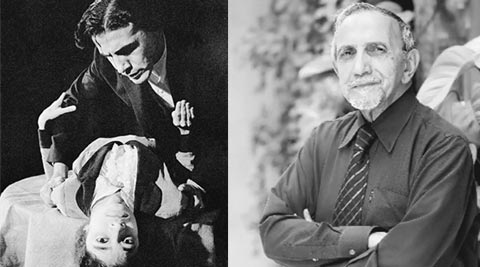Click here to follow Screen Digital on YouTube and stay updated with the latest from the world of cinema.

THE THREE-FLOOR art gallery at Delhi’s Lalit Kala Akademi thunders and creaks with hammering and hauling. On a weekday afternoon, the hallways are caught up in the rush of affairs — giant cardboards being hefted from one room to another, temporary walls have been raised and workers run around in apocalyptic speed. “It’s been a very long process,” says theatre director Amal Allana, adding, “It’s gone on for more than 20 years in a sense.”
The magnitude of Allana’s efforts reflect the subject she has been carrying for the last two decades or so — that of her father, the legendary theatre director Ebrahim Alkazi. “Theatre is an ephemeral art. When the performance is over, it only remains in the minds of people and the reviews. So, to be able to recreate some sense of the work of a person — especially a person like Mr Alkazi — is very important,” says Amal.
“Designing an exhibition of the chronology of a person’s work is easier, but how do you capture the sense, spirit and passion of a person? The first idea that came to me was that I should set this in the context of what was happening in India around the Independence. Everybody in the arts was looking for a different identity and direction,” says Nissar, who has designed the show.
Alkazi’s individual quest around that time has resulted in a section, one of the nine in the exhibition, called “The Alkazi Times”, an idea that borrows from the format of a newspaper and has 16 panels that charts the movement from the mid-’40s to the ’60s.
Some of the images have an instant recall. Iconic black-and-white shots of plays, staged in prosceniums or against the backdrop of monuments in Delhi, resemble paintings. This impression builds further with the exhibition’s focus on Alkazi’s involvement with institution building and teaching. “Because of his broad vision and experience in the arts, while understanding what it meant to be an Indian around the time of Independence, he really created the master plan for many decades,” says Nissar. Alkazi’s students include the likes of Om Shivpuri, Sudha Shivpuri, Uttara Baokar, BV Karanth, Naseeruddin Shah and Om Puri.
Perhaps the most noted aspects of Alkazi, who is also the founder of Art Heritage Gallery at Mandi House, is his preoccupation with art. “He left theatre in 1977 to promote art through this gallery. We have here some of his paintings from the ’60s. He never found the time to do it later,” says Amal.
The show also comprises models of his famous set designs, letters and sketches, along with posters by Amal, based on scenes from some of his biggest productions. Of the video installations, one was shot in 1992, when Alkazi was invited by the National School of Drama to direct three plays — Julius Caesar, Din ke Andhere Mein and Rakt Kalyan. “When he was rehearsing, we decided to set cameras. No one had documented plays before. What we have is a beautiful footage of him in action with his actors,” says Amal.
The current show will also have a book launch and will travel to Mumbai soon. Along with the show, Amal is also working on her father’s biography. “We had a tiny little flat in Bombay and some of the biggest plays were rehearsed in our drawing room. So, obviously, it’s a part of my own personal history. But I’m brutally objective. He has had an independent life and we have all been brought up like that too,” she says.
The exhibition is on till February 3 at Lalit Kala Galleries, Ferozeshah Road, Delhi.
Contact: 23009200
Click here to follow Screen Digital on YouTube and stay updated with the latest from the world of cinema.